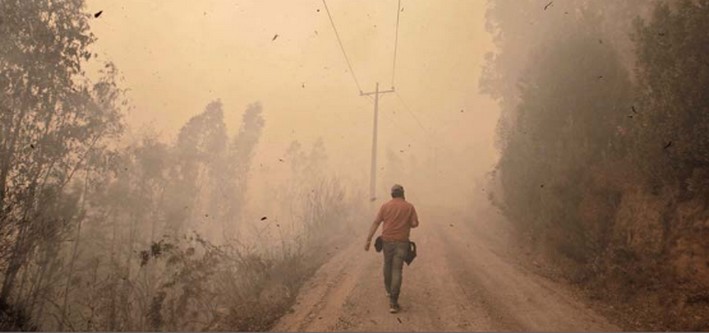Nearly 400 authorizations for agricultural burns were issued by the National Forestry Corporation (Conaf) for Friday the 21st and Saturday the 22nd, amid a critical climate situation that had been warned by the Chilean Meteorological Directorate: on Thursday the 20th at 10:59 AM, it issued a forecast predicting winds with intensities of up to 60 to 80 km/h, with gusts reaching 90 km/h for the Biobío and La Araucanía regions.
These were compounded by preventive alerts issued by the National Disaster Prevention and Response Service (Senapred) for the same areas, warning—based on technical reports from Conaf itself—of the onset of easterly winds (Puelche) starting on the night of Saturday the 22nd.
In this context, demands arose in the region for an investigation into why, given these forecasts, the burns were authorized. This comes after multiple emergency situations over the weekend, including homes and even a school destroyed by fire.
"Serious Negligence"
"There was a lack of coordination here. Conaf and Senapred must answer and take responsibility if it is confirmed that the fires started due to the reactivation of crop residues. From the Ministry of Agriculture downward, they should step aside. This isn’t just another government mistake; it’s serious negligence that has left homes burned, caused evacuations, and terrorized the population," said Deputy Miguel Mellado (RN).
Additionally, there are reports of alleged intentionality due to evidence of multiple ignition points in some fires, as noted by forestry companies, agricultural leaders, and others, who called for an investigation into the causes of the emergencies that also forced evacuations.
In a statement, the Temuco Agricultural Development Society (Sofo) asserted that "agricultural burns cannot be automatically blamed, especially when there is evidence and indications of possible intentionality."
Sofo pointed out that the authorizations were only for Friday and Saturday, and that "Sunday and Monday were completely prohibited," which may not have stopped individuals without permits from using fire to clear crop residues.
Meanwhile, the Multigremial of La Araucanía called for "a serious, thorough, transparent, and swift investigation to clarify how these fires started," urging against "rushed conclusions." The group highlighted the coincidence of such events with the arrest of Tomás Antihuen, charged with the murder of three police officers in Cañete a year ago.
Ramón Figueroa, president of the Forest Protection Department at the Chilean Wood Corporation, urged avoiding the use of fire, as the peak wildfire season is not over, and given the lack of rain, combustible material is abundant and dry. He also called for reporting any evidence of third-party involvement.
Nevertheless, Aída Baldini, executive director of Conaf, pointed to the winds, which exceeded 100 km/h, as the main cause of the scale of the disasters."
Source:El Mercurio







Comentarios (0)
No hay comentarios aún. ¡Sé el primero en comentar!
Deja un comentario